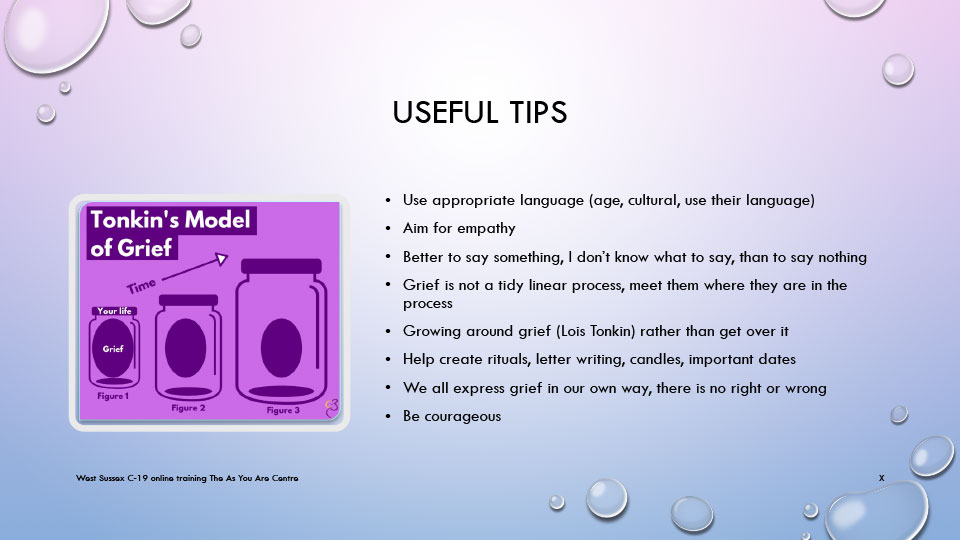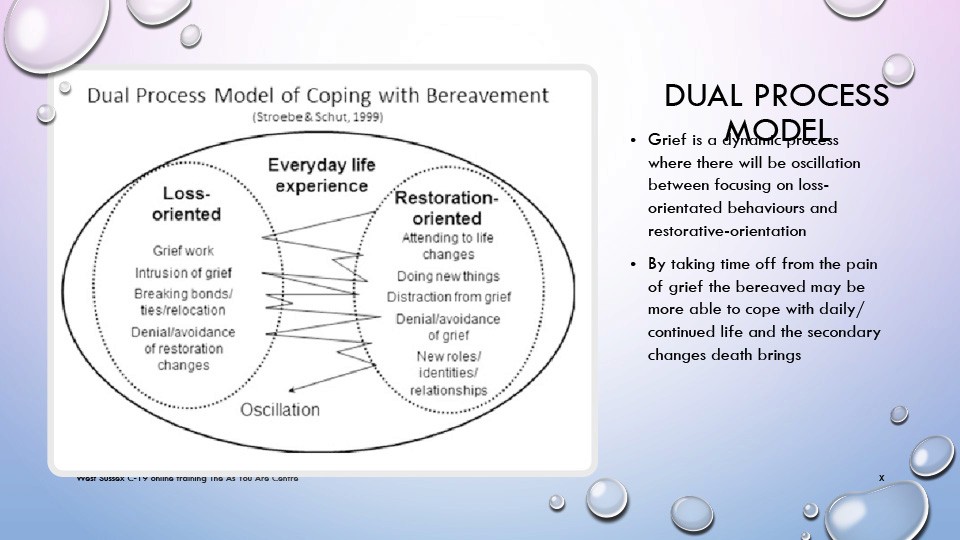On bereavement
“On bereavement” for clients and some techniques used for practitioners and clients
“Each person’s grief is as unique as their fingerprint. But what everyone has in common is that no matter how they grieve, they share a need for their grief to be witnessed. That doesn’t mean needing someone to try to lessen it or reframe it for them. The need is for someone to be fully present to the magnitude of their loss without trying to point out the silver lining.” – David Kessler
In this blog I would like to look at ways that your unique bereavement or loss can be honoured and worked through in counselling and how the counsellor can bear witness by standing alongside you in this process.
What is complex grief?
What is complex grief? If a person close to you, that you had a close relationship with, dies, there is acute grief. A state of acute emotional distress. A state in which the reality of the loss intrudes into awareness, accompanied by intense pain and, at other moments, is hidden behind a thick wall of disbelief. Gradually, you may or may not be able to adapt to the reality that the other person is gone forever.
Over time and this may be a longer time for some people than others, you may get more room for new activities and new relationships. We can grow around grief. The size of the loss does not necessarily change but the room around it can expand.

Image © AYA
We can speak of disturbed or “complex grief” if the state of acute emotional distress persists. If the bereaved person continues to experience disbelief about the irreversibility of the loss. If the death still feels as something that happened yesterday, even when months or years already passed since the loss. It may be that your emotional life is still overwhelmed by the pain and the reverberations of grief.
The main goal of most grief counselling is to help the client integrate the reality of their loss into their life going forward, and helping them to maintain a healthy bond to the loved one they lost (Neimeyer, 2013). According to Dr. Robert A. Neimeyer, an active clinical psychologist and expert in grief therapy, there are two important first steps for working with a new client reeling from their loss:
Processing the Event Story of the Death
Counsellors working with a bereaved client will first encourage the client to engage in a healing re-telling of the loss. The counsellor must create a safe space for the client to open up and build trust, so when the time comes to help the client rewrite the story of their loss, they are able to communicate effectively having built a relationship with their counsellor.Accessing the Back Story of the Relationship
In addition to hearing about the loss event itself, the counsellor will also learn about the client’s relationship with the loved one they lost. As Neimeyer says, “Death may end a life, but not necessarily a relationship.” The counsellor will guide the client through learning how to reconstruct their bond with their loved one rather than relinquishing it (Neimeyer, 2013).
Techniques used in Grief Counselling
Three of the biggest things a good grief counsellor can do for their client are to:
Let them talk about the person who has died; ask them about the person, and allow them to speak about their lost loved one in a safe space.
Distinguish grief from trauma; if the client is struggling to get an image out of their head or experiencing flashbacks to the moment they learned of their loved one’s death, they are experiencing trauma, which can keep them from working through their grief.
Deal with any guilt they are feeling and help them organize the grief; the client may feel guilty about what they did or didn’t do while their loved one was alive, or they may feel guilty about not feeling “sad enough” or moving on while their loved one is dead. Encourage them to let go of the guilt and commit to living a life that will honour the person who has died, even if that means forgetting about them for a little while (Tyrrell, n.d.).
Interventions and Strategies in Grief Therapy
Aside from the three important techniques listed above, there are many other more specific interventions and modified strategies that can be used to support a client in grief therapy. For example, Dr. Alan D. Wolfelt developed the Companioning Model of Bereavement caregiving, in which the counsellor acts as a companion and helper for the client. They are present for their client, observing their experience; however, “observe” in this context doesn’t mean just watching, but bearing witness to their experience and to watch out for them.
Companioning is about…
Honouring the spirit, not focusing on the intellect.
Curiosity, not expertise.
Learning from others, not teaching them.
Walking alongside, not leading.
Being still, not frantic movement forward.
Discovering the gifts of sacred silence, not about filling every painful moment with words.
Listening with the heart, not analysing with the head.
Bearing witness to the struggles of others, not directing them.
Being present to another person’s pain, not taking away the pain.
Respecting disorder and confusion, not imposing order and logic.
Going to the wilderness of the soul with another human being, not thinking you are responsible for finding the way out (Wheeler-Roy & Amyot, 2004).
Following this model, the counsellor will:
Listen in a supportive manner to the client’s concerns.
Help disaster survivors recognize that, in most cases, their emotional reactions are natural, normal, and to be expected.
Assist survivors to reduce additional stress by organizing and prioritizing day-to-day and recovery-related tasks.
Help individuals to understand and recognize the wide range of reactions to trauma, such as numbness, frustration, confusion, anger, anxiety, sadness, and feelings of helplessness.
Assist individuals to draw on their own strengths and develop healthy coping mechanisms that permit them to gradually resume their pre-disaster (or pre-loss) level of functioning.
Sensitively and caringly help individuals to grieve their losses in their own unique ways.
Systematically draw upon an array of recovery resources for appropriate referrals (Wheeler-Roy & Amyot, 2004)
Dr. Kenneth Doka recommends encouraging clients to use rituals to connect with their loved one and carry on despite their grief. These four types of rituals can help:
Rituals of Continuity – These rituals establish that the lost loved one is still a part of the client’s life, that the bond is still there.
Rituals of Transition – This type of ritual marks a significant change that has occurred in the grief response, such as cleaning out the room of the deceased or donating their belongings.
Rituals of Affirmation – In this ritual, the client can discharge any built-up regret by writing a letter or a poem to the deceased thanking them for their love and support.
Rituals of Intensification – These rituals connect group members and reinforce their common identity; a military unit may gather periodically to remember their fallen comrades or the survivors of an act of violence may revisit the site and place flowers or erect a memorial to those they lost (Wheeler-Roy & Amyot, 2004).
Smaller, everyday rituals can also be helpful for those grieving a loss; these are called Rituals to Commemorate, and include things like lighting a candle and thinking of the loved one, watching home videos or going through old pictures of the loved one, traveling to a place the loved one always wanted to visit, or visiting the burial site and leaving a tribute or symbolic item, like flowers or a balloon.
The mental health professional will not always encourage or apply the same techniques equally; there are a million different ways to grieve, and every healthy method of grieving is valid. However, there are two poles in grieving, with people falling anywhere on the spectrum between. The poles are “Intuitive Griever” and “Instrumental Griever.”
The Intuitive Griever experiences feelings associated with their grief intensely and is open with expressions of their grief (e.g., crying, lamenting their loss). For them, successful strategies to cope with their grief involve facilitating their experience and expressing their feelings.
They may experience prolonged periods of confusion, inability to concentrate, disorganization, and disorientation, and they might also suffer from physical exhaustion and/or anxiety.
On the other hand, the Instrumental Griever is more prone to thoughts of grief than feelings of grief and is often reluctant to talk about their feelings. They prioritize mastery of themselves and their environment and find success in problem-solving strategies. They may experience brief periods of cognitive dysfunction, like confusion, forgetfulness, and obsessiveness, and they may have increased energy levels (Wheeler-Roy & Amyot, 2004).
Tips for Coping with Grief
In addition to the techniques and strategies listed above, counsellors will likely also offer the following three tips for those who are grieving.
1. Do not grieve alone
It’s vital that you stay connected with others during this time. Your support system may include your family, friends, leaders in your faith, a bereavement support group, and/or a licensed mental health professional to help you cope.
Your support system can help you:
Make the funeral arrangements or help you with new responsibilities.
Find peace and comfort through your faith’s mourning rituals.
Share your grief with others who can relate.
Work through your difficult emotions in a safe setting.
2. Take good care of yourself
It can be easy to forget about our own needs when we are reeling from loss, but neglecting yourself won’t help you effectively deal with your grief.
Remember to:
Do something creative to express your feelings (e.g., write something, paint, put together a scrapbook, or play a musical instrument).
Eat, sleep, and exercise to avoid adding physical fatigue to your emotional fatigue.
Be patient with yourself and allow yourself to feel whatever you feel.
Understand what triggers your grief and prepare for those triggers (e.g., plan to take a day or two off of work, let your friends and family know you’ll need extra support, etc.).
Seek professional grief counselling
Not everyone will need the services of a counsellor or therapist during their grieving period, but it can be very helpful for those who are really struggling. A qualified professional can help you understand the grief process and give you the tools you need to cope with your emotions (Therapy Tribe, n.d.).
While everyone grieves differently, these three tips are essential for anyone who must cope with a profound loss.

Image © AYA
If you'd like to find out more, then do get in touch and we can have an initial chat free of charge.


